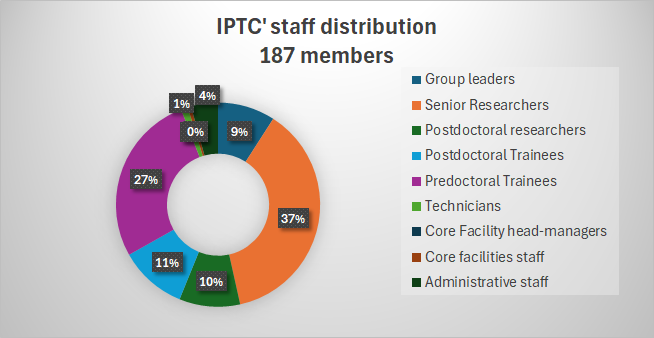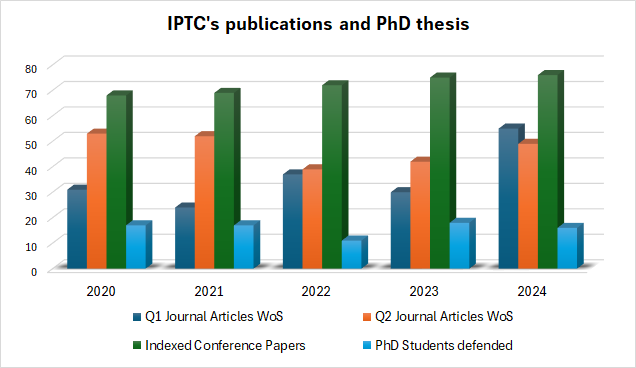IPTC in figures
IPTC has 187 members including 87 senior researchers, 18 postdoctoral researchers, 20 post-doctoral trainees and 51 predoctoral trainees, 6 technical staff and 8 administrative staff. IPTC has 4 researchers included in Stanford’s Top 2% Scientists. In the last 5 years, IPTC’s research staff has increased 10%, the post-trainees 20% and the pre-trainees 100% due to the important increment in funding.
IPTC has an important technical and administrative team that plays a crucial role in the center’s daily operations. Specifically, three laboratory technicians are responsible for maintaining, calibrating, and adjusting the high–performance equipment essential for advanced research activities. Additionally, eight administrative staff members support the comprehensive management of research projects, assisting with grant processing, financial management.

IPTC has a self-financed, project-driven funding model. IPTC’s research, infrastructure, and staff are supported through a diversified mix of competitive grants, industry partnerships, and other initiatives.
- Competitive Research Grants. IPTC leads or participates in >70 competitive projects annually, funded by programs like Horizon Europe, Digital Europe, and EIC Pathfinder. From 2020-2024, we won 3.25M euros/year from international calls and 3.56M euros/year from national and regional programs.
- Industry Contracts and Public-Private Partnerships. IPTC collaborates with companies such as Telefónica, Orange, INDRA, ISDEFE, Huawei, Amazon, Iberdrola, and Airbus. These agreements support joint R&D and tech transfer, generating ~2.05M euros/year.
- Additional Sources: Royalties, patents, chairs, training programs, and sponsorships bring in an average of 200,000 euros/year (2020-2024).
Between 2020 and 2024, IPTC got an average annual income of >8.5M euros. IPTC self-finances operations through project funds because there is not a lot of funding support from the university. To improve long-term sustainability, IPTC aims to expand international funding, deepen industry collaborations, and invest in infrastructure and AI platforms. IPTC is also trying to enhance its commercialization strategy for boosting revenue from patents and research services.

In the last 5 years, IPTC has published 176 articles in Q1 journals and 248 in Q2 journals. IPTC’s researchers have delivered 358 presentations (oral and posters) at international conferences (72 per year) with peer–reviewed proceedings and 7 keynote speeches at invited conferences. Its researchers have also authored 11 books or book chapters per year with prestigious publishers.

In the last 5 years, IPTC has obtained >70 projects per year, coordinating 21 international projects (total budget of 40 M euros) and 13 national initiatives. IPTC has generated 2 international and 15 national patents or SW registrations (6 commercialized, 1/6 of UPM), launched 2 spin–off, and developed impactful software tools and data–driven applications. IPTC has maintained strong collaboration with industry, signing >50 annual contracts. Its excellence has been recognized with 20 international and 30 national awards, including 35 student distinctions and four researchers listed in Stanford’s Top 2% Scientists. IPTC has organized more than 30 international events. IPTC’s research activity has also contributed to public understanding of science, with its publications regularly featured in digital news media. As a training center, it has supervised 79 Ph.D. theses and enabled over 100 months of international mobility.

